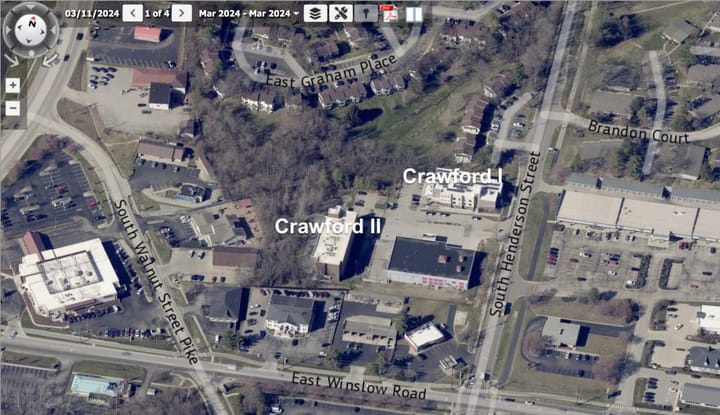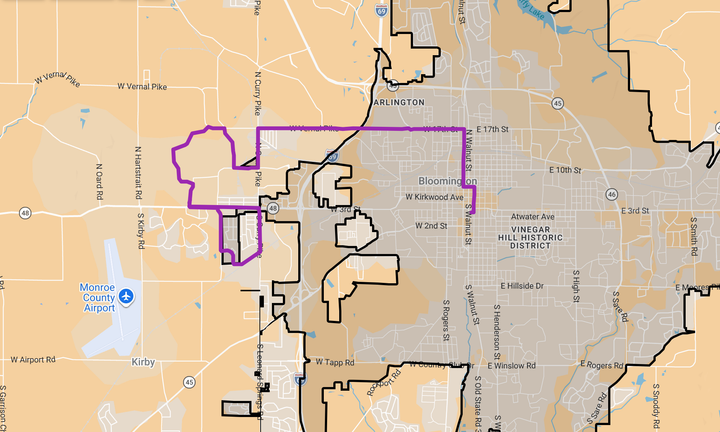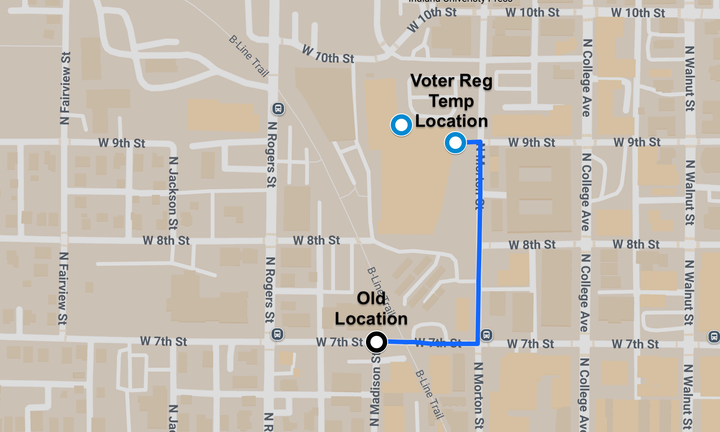$163M budget for 2026 OK’d by Bloomington councilmembers, 2 dissent citing lack of trust
At its Wednesday meeting, Bloomington’s city council approved the city’s $163-million budget for 2026 on a 7–2 tally, with councilmembers Matt Flaherty and Kate Rosenbarger casting the dissenting votes. The total includes planned expenditures from the general fund of about $65.1 million.


At its Wednesday meeting, Bloomington’s city council approved the city’s $163-million budget for 2026 on a 7–2 tally, with councilmembers Matt Flaherty and Kate Rosenbarger casting the dissenting votes.
The $163-million total includes planned expenditures from the general fund of about $65.1 million. The total does not include roughly $57.6 million for the city of Bloomington utilities drinking water and wastewater budgets.
Flaherty and Rosenbarger both cited a lack of trust in Bloomington mayor Kerry Thomson as a reason for their votes against the 2026 budget. Since the council became all-Democrat in 2012, votes against the annual budget have been rare, but not unprecedented. In 2020, Flaherty voted against then-mayor John Hamilton’s 2021 budget.
2026 budget by the numbers
Overall, the $163 million reflects a $16 million increase over the $147 million that was budgeted for 2025. A big part of that difference can be chalked up to the $12,368,767 in spending from food and beverage tax revenue planned for 2026, compared to just $899,400 in food and beverage revenue in 2025. The increase in food and beverage expenditures comes from some of the soft costs associated with the start of construction for the convention center expansion, which are not covered in the basic construction budget, which is paid out of bond proceeds.
The $65.1 million in planned general fund spending for the city of Bloomington 2026 is about $5 million less than the $70.1 million that was planned for 2025.
Yet the 2026 budget incorporates a roughly $5.5 million increase in spending on salaries and wages for 2025 that stemmed from the adoption of a new salary grade system. That was accomplished by shifting some department spending out of the general fund and into the economic development local income tax (ED LIT) fund. Spending for departments like economic and sustainable development, the controller and human resources was previously paid just partially from ED LIT, but for 2026 they are paid completely out of ED LIT.
In addition, some police and fire maintenance, supplies and capital expenses were moved from the general fund to the public safety LIT fund.
The impact of SEA 1 this year on Bloomington’s budget for 2026 translates into about $1.4 million less revenue for the city government than it would have received without the impact of the new legislation.
The $55.6 million in general fund revenue that is planned for 2026 means about $9.5 million in reserves will be tapped, in order to balance out the planned $65.1 million in general fund spending. The cash balance in Bloomington’s general fund at the end of 2024 was about $55 million.
The 2026 budget includes a 2.7% cost of living adjustment for employees who are not covered under a collective bargaining agreement.
A vote against the budget: Flaherty
Councilmember Matt Flaherty delivered an extended critique of the budget and the administration’s approach, focusing on three main areas: equity, policy outcomes, and trust.
On the topic of equity, Flaherty said, “For me, that is the defining value of what it means to be liberal, what it means to me to be a Democrat. Virtually all decisions in other policy areas flow from this, and in my view, we simply aren’t integrating equity as a value in government in a consistent or meaningful way most of the time.” He added, “This year is the first year I feel like we’re actually taking a step backwards.”
Flaherty pointed to an update on the hiring of a DEI position in the mayor’s office that came mid-July this year in the form of a memo from the deputy mayor. The memo stated in part: “Our Legal team has advised against creating a Chief Equity Officer position or any such programs, as it would put the City out of compliance with federal certifications required to continue to receive federal funding.”
On Wednesday, Flaherty described the memo like this: “We got one paragraph from the deputy mayor saying that they are not in a position to allocate funding or undertake this work at the present time, going on to explain that the Trump administration’s opposition to DEO could put us at risk for accessing federal funds.” Flaherty said, “I just find these explanations to be wholly inadequate.”
He added, “By all means, use language strategically when applying for grants, naming programs, et cetera. But now, more than ever, is the time to stand up for our values—if they are indeed our values. And indeed leading cities all over the country are doing just that. I understand the administration’s position here, and I’m opposed to it.”
Flaherty also criticized Thomson for failing to pursue outcomes laid out in “community-driven” plans adopted by the city council. Among those plans are the city’s comprehensive plan. Flaherty analyzed Thomson’s creation of internal “action plans” to determine budget priorities as essentially swapping council-adopted city policies for mayoral priorities, which he said “are not the same thing.” Flaherty added, “The mayor has actually actively opposed or even obstructed implementation of current city policy. To me, that’s unacceptable, and there needs to be accountability for that as well.”
On the topic of trust, as one example, Flaherty pointed to Thomson’s decision not to move the police headquarters into the Showers West building, which had been purchased for that purpose with bonds issued by the city. The city has moved ahead only with the move of the fire department headquarters into Showers West, but now eyes the 714 S. Rogers building as a better location for a new police headquarters.
On Wednesday, Flaherty said he thinks the failure to use Showers West as a police headquarters is “arguably a violation of the bond ordinance.”
A vote against the budget: Rosenbarger
Kate Rosenbarger led off her comments with praise for city controller Jessica McClellan.
But like Flaherty, Rosenbarger also cited a lack of trust as a big reason for voting no on the 2026 budget. She gave a specific example involving the administration’s handling of proposed amendments to the city’s Unified Development Ordinance (UDO).
By way of background, starting in November of 2024, the council started considering resolutions to initiate changes to the UDO, the city’s zoning code. Unlike other kinds of legislation, the council can’t put a change to the zoning code in front of itself. Changes to zoning code have to land in front of the council based on a recommendation—either for or against adoption—from the city plan commission.
But the council doesn’t have to wait quietly and hope that the plan commission eventually considers the kind of changes it wants to see. The council has the option to force consideration of a specific proposal by the plan commission, by invoking a section of state zoning code. Under that section of state law, the council can pass a resolution directing the plan commission to consider a proposal, so that it can eventually reach the council’s agenda.
It was a scenario involving those kinds of resolutions that Rosenbarger recounted on Wednesday, to explain why she does not trust Bloomington mayor Kerry Thomson. In mid-March, two such resolutions appeared on a city council agenda, one sponsored by Flaherty and the other by Rosenbarger. Both failed even to get introduced, founding on that normally perfunctory step by 4–4 votes. (Sydney Zulich was absent, but said later she would have voted no.)
Thomson said at the time that she learned of the resolutions that appeared on the council’s agenda at the same time as the general public, when the meeting information packet was released.
On Wednesday, Rosenbarger said a council colleague had told her that they relied on the mayor’s description of the way the resolutions were developed: “I had a conversation with one council member, and they told me they voted no on introduction, because they had talked to the mayor, and the mayor told them it was the first time she had seen the resolutions, and that they were developed in a vacuum.” Rosenbarger continued, “I was shocked by that, because [the mayor] had been on the emails, as well as city staff, in the meetings …” Rosenbarger summed up her view: “It’s really hard, because there’s like, no trust there for me. … The lack of trust is so extreme for me, I want to use a no vote to show that.”
Votes for the budget: Other councilmembers
Councilmembers who supported the budget cited the administration’s responsiveness, the challenges of state-imposed revenue constraints, and the importance of maintaining city services and employee compensation.
Dave Rollo said: “I appreciate the administration and the controller for meeting the challenges of state legislation changes in taxation and reduced revenue, and I appreciate the work that she’s done in navigating that.” Rollo also mentioned the 2.7% COLA: The administration has been open to increasing salaries from 2 to 2.7% to keep place with cost of living increases, and I appreciate that. That was no small feat, and I think that was the appropriate thing to do.” In what could be analyzed as a response to Flaherty, Rollo said, “I appreciate the mayor’s efforts to find the proper location for a police station.”
Andy Ruff expressed appreciation for the Thomson administration’s approach: “I also want to thank the administration for what I think was a real effort at providing information when it was requested, and providing it in a relatively timely way. ”
Council president Hopi Stosberg indicated she felt the administration and the council had worked together on the budget: “I do feel as though this process has been collaborative, and I have felt like the administration has been responsive to things that I’ve said, both individually as part of fiscal committee comments and during the question and answer period of the hearings itself.”
Isabel Piedmont-Smith expressed some frustration about the lack of progress towards outcomes-based budgeting: “We have ostensibly been working towards outcome-based budgeting, but it has proceeded very slowly and without prioritization of which outcomes are more important than others.” She said it was not anybody’s fault but described a transition to outcome based budgeting as “a very heavy lift.”
Piedmont-Smith praised the city staff efforts to give the council information: “I appreciate the openness with which our new controller has discussed budget processes with us and presented data. … I think there’s been a learning curve on her part and on our part, as far as what we need and want to see as far as data before we make budget decisions.”




Comments ()